Ukraine stops transit of Russian gas to EU in end of era
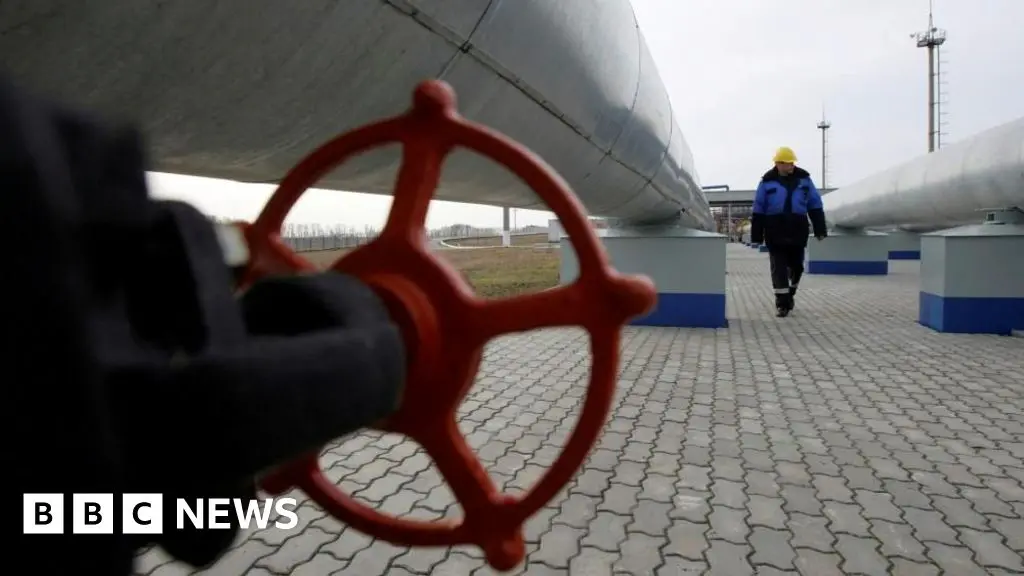
Russian gas has stopped flowing to EU states via Ukraine after a five-year deal expired, marking the end of a decades-long arrangement.
Ukrainian President Volodymyr Zelensky said that his country would not allow Russia to "earn additional billions on our blood". Poland's government meanwhile said the cut-off was "another victory" against Moscow.
The European Commission said the EU had prepared for the change and most states could cope. Moldova, which is not in the EU, is already suffering shortages.
Russia can still send gas to Hungary, Turkey and Serbia through the TurkStream pipeline across the Black Sea.
Russian company Gazprom confirmed that gas exports via Ukraine to Europe stopped from 08:00 local time (05:00 GMT) on Wednesday.
Moscow has transported gas to Europe through Ukraine since 1991.
While immediate effects are light, the strategic and symbolic impact for the whole of Europe is enormous.
Russia has lost an important market, but its president, Vladimir Putin, says EU countries will suffer most.
The EU has significantly reduced imports of gas from Russia since it launched its full-scale invasion of Ukraine in 2022, but a number of eastern member states still depend largely on the supplies, making Russia about €5bn ($5.2bn; £4.2bn) a year.
Russian gas was less than 10% of the EU's gas imports in 2023, according to the bloc. That figure was 40% in 2021.
But several EU members, including Slovakia and Austria, continued to import significant amounts of gas from Russia.
Austria's energy regulator said that it did not forecast any disruption as it had diversified sources and built up reserves.
But the end of the transit deal has already caused serious tensions with Slovakia, which is now the main entry point of Russian gas into the EU and earned transit fees from piping the gas on to Austria, Hungary and Italy.
Slovakia has said it will pay more for alternative routes. Its energy regulator announced in early December that Gas prices for consumers would rise in 2025.
Robert Fico, Slovakia's prime minister, said on Wednesday that the end of the deal would have "drastic" consequences for EU countries, but not on Russia, Reuters reported.
On Friday, Fico - who had just made a surprise visit to Moscow for talks with Putin - threatened to stop supplying electricity to Ukraine.
This prompted Zelensky to accuse Fico of helping Putin "fund the war and weaken Ukraine".
"Fico is dragging Slovakia into Russia's attempts to cause more suffering for Ukrainians," the Ukrainian president said.
Poland has offered to support Kyiv in case Slovakia cuts off its electricity exports - supplies that are crucial to Ukraine, whose power plants come under regular attack from Russia.
Polish foreign minister Radoslaw Sikorski told BBC Radio 4's Today programme there were alternative gas supply routes from international markets, such as a terminal in Croatia and connections from Germany and Poland.
"These routes should be explored so that Russia doesn't make money on selling oil and gas to the European Union," Sikorski said.
Poland is importing gas from the US, Qatar and the North Sea, he added.
"As far as I understand, all countries have alternative routes," he said.
Moldova - which is not part of the EU - could be seriously affected by the end of the transit agreement. It generates much of its electricity at a power station fuelled by Russian gas.
It also supplied the Russia-backed breakaway region of Transnistria, a small sliver of land sandwiched between Moldova and Ukraine where around 300,000 people live.
Russian gas company Gazprom had said on 28 December it would restrict gas to Moldova on 1 January because it said it had failed to fulfil its payment obligations.
Dorin Recean, Moldova's prime minister, denied the alleged debt and accused Russia of using "energy as a political weapon" in a social media post. He said the move would leave Transnistria "without light and heat in the middle of the winter".
Heat and hot water was cut off to Transnistria "due to the temporary cessation of gas supplies" at 07:00 local time (05:00 GMT) on Wednesday, energy company Tirasteploenergo said on Telegram.
It urged residents to dress warmly, gather family members together in a single room, hang blankets or thick curtains over windows, and use electric heaters.
The temperature was due to drop below 0C on Wednesday night. Medical institutions and hospitals were still being supplied, the company said.
Moldova's energy minister, Constantin Borosan, said his government had taken steps to ensure stable power supplies, but called on citizens to save energy.
A 60-day state of emergency in the energy sector has been in place since mid-December.
President Maia Sandu accused the Kremlin of "blackmail" possibly aimed at destabilising her country before a general election in 2025. The Moldovan government also said it had offered aid to Transnistria.
The EU has found alternative sources in liquefied natural gas (LNG) from Qatar and the US, as well as piped gas from Norway, since Russia's invasion of Ukraine.
In December, the European Commission laid out plans to entirely replace gas transiting through Ukraine.
Russian gas era in Europe ends as Ukraine stops transit
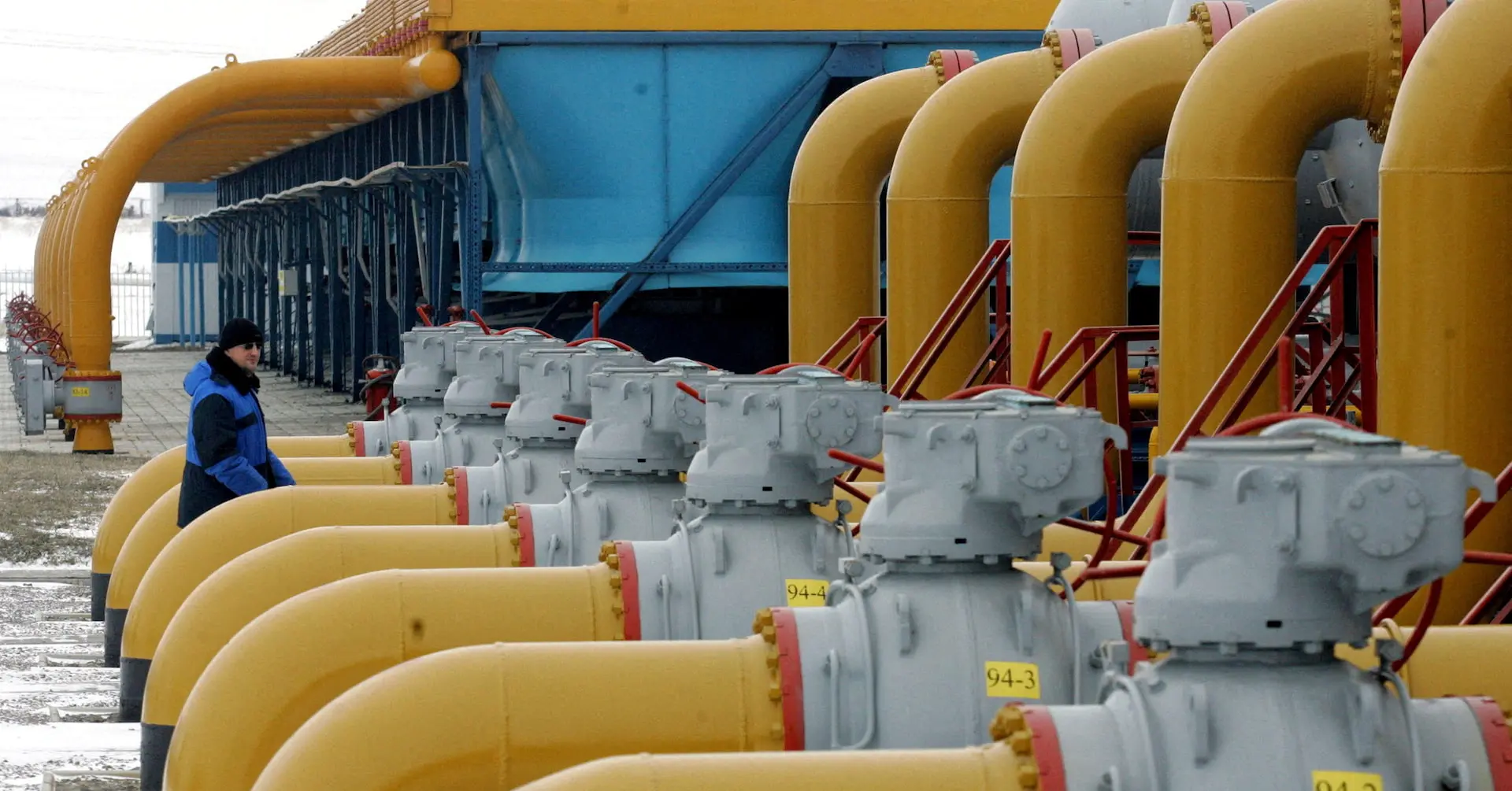
MOSCOW/KYIV, Jan 1 (Reuters) - Russian gas exports via Soviet-era pipelines running through Ukraine came to a halt on New Year's Day, marking the end of decades of Moscow's dominance over Europe's energy markets.
The gas had kept flowing despite nearly three years of war, but Russia's gas firm Gazprom said it had stopped at 0500 GMT after Ukraine refused to renew a transit agreement.
The widely expected stoppage will not impact prices for consumers in the European Union - unlike in 2022, when falling supplies from Russia sent prices to record highs, worsened a cost-of-living crisis and hit the bloc's competitiveness.
The last remaining EU buyers of Russian gas via Ukraine, such as Slovakia and Austria, have arranged alternative supply, while Hungary will keep receiving Russian gas via the TurkStream pipeline under the Black Sea.
But Transdniestria, a breakaway pro-Russian region of Ukraine's neighbour Moldova also reliant on the transit flows, cut off heating and hot water supplies to households early on Wednesday. Local energy company Tirasteploenergo urged residents to dress warmly, hang blankets or thick curtains over windows and balcony doors, and use electric heaters.
Ukrainian President Volodymyr Zelenskiy, writing on the Telegram messaging app, said the end of gas transit through his country to Europe was "one of Moscow's biggest defeats" and urged the U.S. to supply more gas to Europe.
"The more there is on the market from Europe's real partners, the faster we will overcome the last negative consequences of European energy dependence on Russia," he wrote.
Europe's "joint task" now, he wrote, was to support ex-Soviet Moldova "in this period of energy transformation".
The European Commission said the EU had prepared for the cut-off.
"The European gas infrastructure is flexible enough to provide gas of non-Russian origin," a spokesperson for the Commission said. "It has been reinforced with significant new LNG (liquefied natural gas) import capacities since 2022."
Russia and the former Soviet Union spent half a century building up a major share of the European gas market, which at its peak stood at around 35%. But the EU has slashed its dependence on Russian energy since the start of the war in Ukraine by buying more piped gas from Norway and LNG from Qatar and the United States.
Ukraine, which refused to extend the transit deal, said Europe had already made the decision to abandon Russian gas.
"We stopped the transit of Russian gas. This is a historic event. Russia is losing its markets, it will suffer financial losses," Ukraine's Energy Minister German Galushchenko said in a statement.
Ukraine will lose up to $1 billion a year in transit fees from Russia. To help offset the impact, it will quadruple gas transmission tariffs for domestic consumers from Wednesday, which could cost the country's industry more than 1.6 billion hryvnias ($38.2 million) a year.
Gazprom will lose close to $5 billion in gas sales.
The company halted supply to Austria's OMV (OMVV.VI) , opens new tab in mid-November over a contractual dispute but in recent weeks Russian gas has been reaching Austria via Slovakia at a rate of around 200 gigawatt hours (GWh) per day. For Jan. 1, only about 7 GWh per day is expected to flow from Slovakia to Austria, Austrian energy regulator E-Control said.
Slovakia's main gas buyer SPP said it would supply its customers mainly via pipelines from Germany and also Hungary, but would face additional transit costs.
Combined pipeline routes from Russia delivered a record high 201 billion cubic metres (bcm) of gas to Europe in 2018.
The Nord Stream route across the Baltic Sea to Germany was blown up in 2022 and the Yamal-Europe pipeline via Belarus has also shut.
Russia shipped about 15 bcm of gas via Ukraine in 2023, down from 65 bcm when the last five-year contract began in 2020.
($1 = 41.9000 hryvnias)
Ukraine just stopped Russian gas flows to Europe. Here's who's most at risk
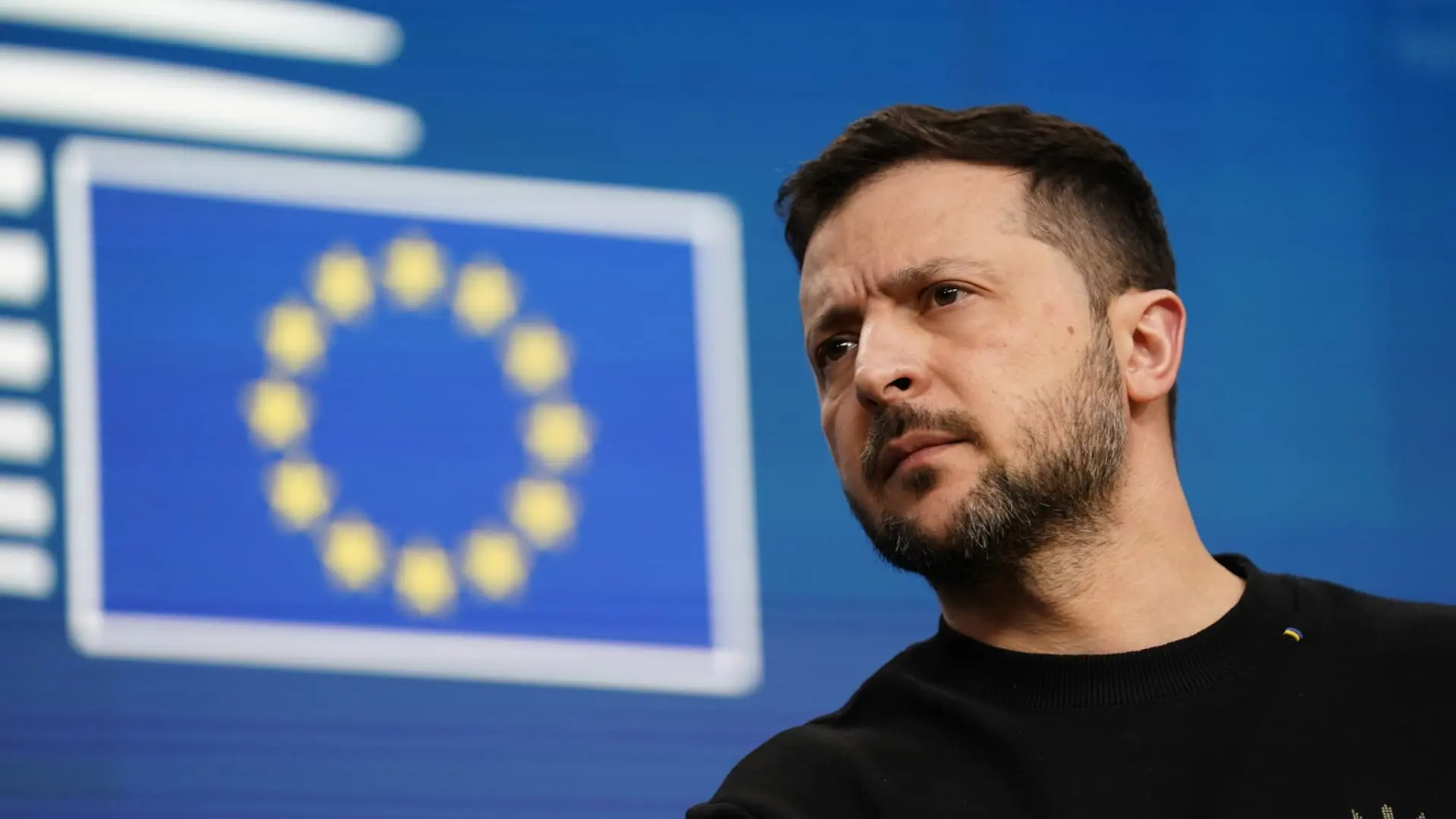
Ukraine halted the flow of Russian gas to several European countries on New Year's Day, bringing an end to Moscow's decades-long dominance over Europe's energy markets.
Russia's state-owned energy giant Gazprom confirmed gas exports to Europe via Ukraine stopped at around 8 a.m. local time (5 a.m. London time) on Wednesday.
The widely expected move marks the end of a five-year transit agreement between Russia and Ukraine, with neither side willing to strike a new deal amid the ongoing war.
Ukrainian President Volodymyr Zelenskyy said last month that Kyiv was not prepared to prolong the transit of Russian gas, adding, "We will not give the possibility of additional billions to be earned on our blood."
Russia, which has transported gas to Europe via Ukrainian pipelines since 1991, says European Union countries will suffer the most from the supply shift. Moscow can still send gas via the TurkStream pipeline, which links Russia with Hungary, Serbia and Turkey.
Ukraine will lose up to $1 billion a year in transit fees from Russia due to the stoppage, according to Reuters, while Gazprom is poised to lose close to $5 billion in gas sales.
The European Commission, the EU's executive arm, said it had been working with EU member states most impacted by the end of the gas transit agreement to ensure the entire 27-nation bloc was prepared for such a scenario.
Slovakia, Austria and Moldova are among the countries most at risk from the stoppage. They were the European countries most dependent on transit volumes of Russian gas in 2023, according to Rystad Energy, with Slovakia importing roughly 3.2 billion cubic meters that year, Austria receiving 5.7 billion cubic meters and Moldova getting 2 billion cubic meters.
Austria has insisted it is well prepared for the stoppage, but others were much more concerned.
Slovakia's prime minister, Robert Fico, warned that Ukraine's termination of the gas transit agreement would have a "drastic" impact on the EU, without harming Russia. Fico also threatened to cut electricity supplies to neighboring Ukraine.
The prime minister, a vocal critic of the EU's support for Ukraine in the ongoing war, made a surprise visit to Moscow for talks with Russian President Vladimir Putin shortly before Christmas.
Moldova, which is not a member of the EU, declared a 60-day state of emergency last month over energy security fears.
A total of 56 lawmakers of Moldova's 101-seat parliament voted in favor of a nationwide state of emergency, which the government said at the time would allow the country to apply a series of measures to prevent and mitigate the threat of insufficient energy resources.
Ukrainian Energy Minister Herman Galushchenko described the cessation of Russian gas flows via Ukraine as a "historic event."
"Russia is losing markets, it will suffer financial losses," Galushchenko said via Telegram on Jan. 1, according to a Google translation.
"Europe has already decided to abandon Russian gas. And the European initiative Repower EU provides for exactly what Ukraine has done today," he added.
Separately, Polish Foreign Minister Radek Sikorski hailed the development as a political victory, accusing Russia's Putin of having tried to "blackmail Eastern Europe with the threat of cutting off gas supplies."
The latest data compiled by industry group Gas Infrastructure Europe shows the EU's gas storage facilities are around 73% full. In Germany, Europe's biggest economy and largest gas consumer, inventories are currently at nearly 80%.
"Without Azerbaijan or another third party transiting the gas following a swap deal with Russia, the EU will require about 7.2 [billion cubic meters] of gas to be sourced from the LNG market," Christoph Halser, gas and LNG analyst at Rystad Energy, said in a research note.
"Terminals in Poland, Germany, Lithuania and Italy could forward these volumes to the most affected counties, such as Slovakia and Austria."
Henning Gloystein, practice head of the energy, climate and resources team at Eurasia Group, said Ukraine's decision to halt the flow of Russian gas to the EU is no surprise given that both Kyiv and Moscow have long said they would not be willing to renew a deal under current war conditions.
In a research note, Gloystein said the expiry of the deal does not threaten EU winter energy security, citing steps taken by EU importers to prepare for the cut in supply and the mild winter weather seen across most of Europe.
Gloystein said gas price moves over the coming months would likely hinge on political developments in the Russia-Ukraine war and remaining winter weather conditions.
"On the political front, there are ongoing talks between some EU members (e.g. Slovakia, where many of Ukraine's pipelines enter the EU), Russia, and Ukraine to find a compromise that may allow for some resumption of supplies. However, there has been no progress during negotiations around the turn of the year," Gloystein said.
"On the weather front, expectations are currently for above average temperatures for the remainder of Europe's winter, which implies the impact of the cuts will be limited," he added.
The front-month gas price at the Dutch TTF hub, a European benchmark for natural gas trading, was last seen up 1.2% at 49.49 euros ($50.78) per megawatt-hour on Thursday, according to New York's Intercontinental Exchange.
Europe's Russian gas era comes to an end as Ukraine transit stops
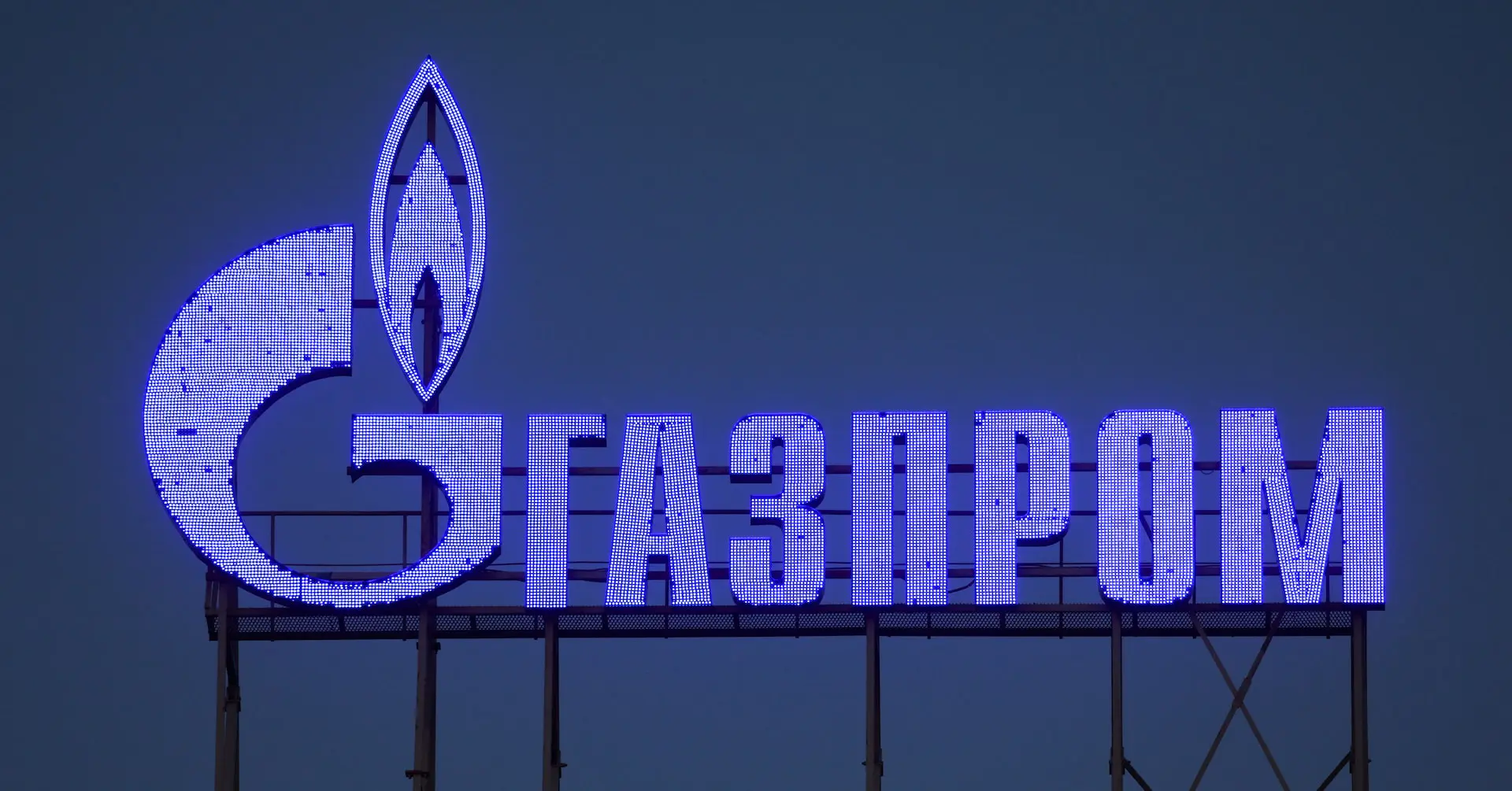
MOSCOW, Dec 31 (Reuters) - Russia’s once-dominant gas supply to Europe via Ukraine, which flowed for decades, is set to end on New Year’s Day with the collapse of a contract between the two warring countries that paid out billions to Moscow in gas revenue and to Kyiv in transit fees.
The shutdown of Russia's oldest gas route to Europe ends a decade of fraught relations sparked by Russia’s seizure of Crimea in 2014.
The European Union redoubled its efforts to reduce its dependence on Russian energy after the outbreak of the war in Ukraine in 2022 by seeking alternative sources.
Liquefied natural gas (LNG) from Qatar and United States has helped the EU find alternative supply. Piped supply has come from Norway.
The change was clear last year as Russian state-controlled gas exporter Gazprom recorded a $7 billion loss, its first since 1999, despite its efforts to boost exports to new buyer China.
The remaining buyers of Russian gas via Ukraine such as Slovakia and Austria have also arranged alternative supply.
A spokesperson for Austria's energy ministry said on Tuesday that due to purchases made via Italy and Germany and the filling of storage, supply for consumers was guaranteed.
Slovakia will also not risk a shortage, though now faces an extra 177 million euros ($184 million) in fees for alternative routes, its Economy Ministry said.
A European Commission spokeswoman said EU preparations had included energy efficiency measures, renewable energy development and a flexible gas system.
"The European gas infrastructure is flexible enough to provide gas of non-Russian origin to Central and Eastern Europe via alternative routes. It has been reinforced with significant new LNG import capacities since 2022," said Anna-Kaisa Itkonen.
Analysts foresee minimal market impact from the stoppage which was confirmed on Tuesday as data from Ukraine's gas transit operator showed Russia had not requested any gas flows for Jan. 1 through the Ukrainian pipeline to Europe as of 1700 GMT.
They say the end of the transit deal is unlikely to cause a repeat of the 2022 EU gas price rally as the remaining volumes are relatively small.
The gas market showed little reaction on Tuesday, with European benchmark gas prices ending at 48.50 euros per megawatt hour, up only marginally on the day.
Despite the EU’s progress in replacing Russian supply via Ukraine, Europe has felt the impact, with higher energy costs hitting its industrial competitiveness versus the United States and China, for example.
That has contributed to a major economic slowdown, a spike in inflation and has worsened a cost-of-living crisis.
Ukraine now faces the loss of some $800 million a year in transit fees from Russia, while Gazprom will lose close to $5 billion in gas sales.
Moldova, once part of the Soviet Union, is among the countries worst affected. It says it will now need to introduce measures to reduce its gas use by a third.
Russia and the former Soviet Union spent half a century building up a major share of the European gas market, which at its peak stood at around 35%, but the war in Ukraine has all but destroyed that business for Gazprom.
The Yamal-Europe pipeline via Belarus has also shut and the Nord Stream route across the Baltic Sea to Germany was blown up in 2022.
Combined, the various routes delivered a record high 201 billion cubic metres (bcm) of gas to Europe in 2018.
Russia shipped about 15 bcm of gas via Ukraine in 2023, down from 65 bcm when the last five-year contract began in 2020.
The only Russian gas route still operating is TurkStream which crosses the Black Sea to Turkey.
TurkStream has two lines - one for the Turkish domestic market and the other supplying central European recipients including Hungary and Serbia.
($1 = 0.9601 euros)
Russia just lost a multibillion-dollar income stream
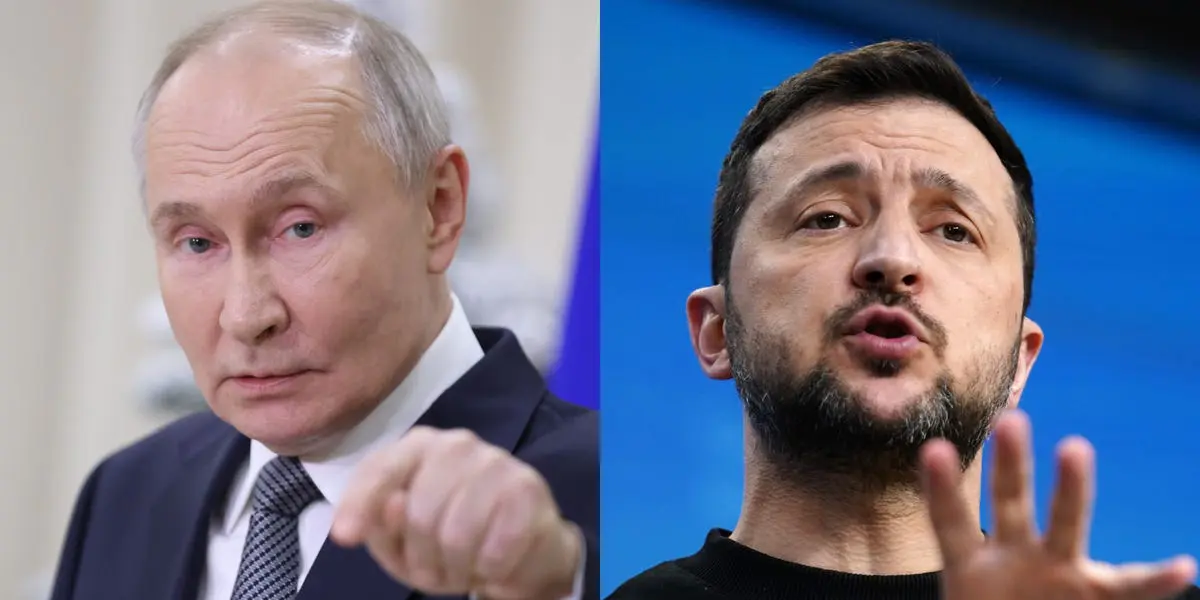
Russia is no longer able to send natural gas to Europe through Ukraine's pipelines after a five-year deal, struck before the war began, expired on Wednesday.
It marks the end of a long-standing arrangement that used Ukraine as a conduit for westbound Russian gas — an agreement that continued even as full-scale war broke out in 2022.
European countries that received that gas, such as Slovakia and Austria, were paying Russia for this energy. Reuters calculated in December that the Russian economy would earn about $5 billion in 2024 alone from piping gas through Ukraine.
The news agency also estimated that Kyiv stood to receive between $800 million to $1 billion over that year from collecting transit fees.
But Ukraine had signaled for months that it planned to let the deal expire on January 1, 2025, and it's now made good on that pledge.
"When Putin was presented with the Russian presidency more than 25 years ago, the annual gas transit through Ukraine to Europe totaled more than 130 billion cubic meters. Today, it equals 0," Ukrainian President Volodymyr Zelenskyy wrote.
Ukraine's energy minister, Herman Halushchenko, said the transit deal ceased because of national security reasons.
The Russian gas conglomerate Gazprom confirmed on Wednesday that its energy flows through Ukraine had stopped, citing "repeated and explicit refusal of the Ukrainian side to extend these agreements."
The now-defunct Ukrainian-Russian deal laid bare the complexities of the war and its political consequences in Europe, with European Union nations struggling to reduce their reliance on Russian energy even as they supplied arms to Ukraine and tried to sanction Moscow.
And as thousands died every week amid bitter fighting in Luhansk, Donetsk, Kharkiv, and Kursk, gas flowing through the same areas allowed both Kyiv and Moscow to profit off each other's goods and facilities.
Ukraine has piped Russian gas to Europe since the fall of the Soviet Union in 1991, and energy customers initially expressed concerns that they wouldn't be able to find an alternative supply in time if the deal expired.
Slovakia's prime minister, Robert Fico, criticized Kyiv's decision in a New Year's address, saying cutting off cheap Russian gas to Europe would create a "drastic impact" on EU nations but not hurt Russia.
Austria, on the other hand, cut ties with Gazprom in December, accusing Russia of blackmailing the Austrian gas company OMV by using energy as a bargaining chip over European support of Ukraine.
Losing Austria as a customer was yet another blow to Moscow's gas industry as Europe weans itself off its Russian energy supply.
The EU said in March that about 8% of its natural gas came from Russia in 2023, down from 40% in 2021.
Since the war began, the US and Norway have emerged as two of the biggest winners among natural-gas suppliers. The EU said gas purchases from the US in 2023 had tripled since 2021, filling nearly 20% of the union's gas imports.
Some countries on the continent, such as Hungary, an EU member led by a president who keeps close ties with Moscow, still have access to Russian gas through the TurkStream pipeline, which runs along the Black Sea to the Balkans.
Moldova, which isn't an EU member state, and its separatist-controlled territory, Transnistria, are expected to be hit hard by the cessation of the Ukraine-Russia deal, with the country's largest power plant historically reliant on Russian gas.
Correction: January 2, 2025 — An earlier version of this story misstated Robert Fico's title. He's the prime minister of Slovakia, not the president.
Ukraine ends supply of Russian gas to Europe
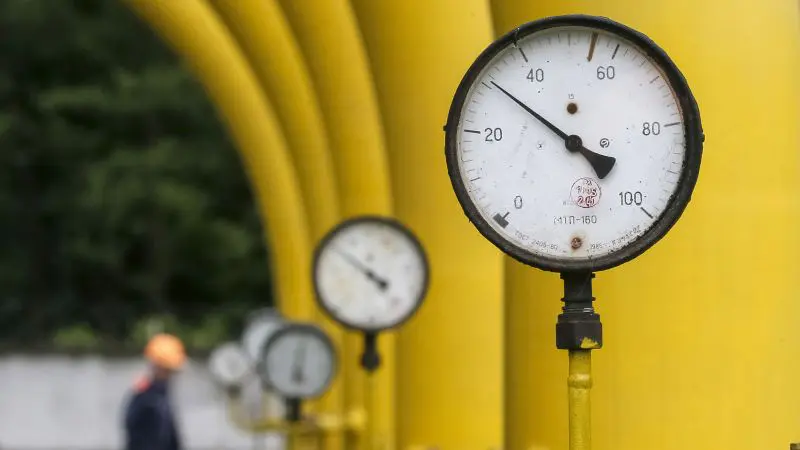
Ukraine has made good on its promise to halt the transport of Russian gas to Europe through its territory after a key deal with Moscow expired on Wednesday.
Ukraine’s refusal to renew the transit deal was an expected but symbolic move after nearly three years of its full-scale war with Russia, and comes after Europe has already drastically cut Moscow’s share of its gas imports. Ukraine’s energy ministry said it ended the deal “in the interests of national security.”
“We have stopped the transit of Russian gas. This is a historic event,” the ministry said in a statement, adding that its gas transportation infrastructure had been prepared in advance of the expiration.
Ukrainian President Volodymyr Zelensky called the move “one of Moscow’s greatest defeats.” In a Telegram post Wednesday, he accused Moscow of “turning energy into a weapon and engaging in cynical energy blackmail against its partners” and expressed hope that the United States would increase its supply of gas to Europe.
Last year, Kremlin-owned gas giant Gazprom, which signed the transit deal with Ukraine’s Naftogaz in 2019, recorded a $6.9 billion loss, its first in more than 20 years, due to diminished sales to Europe, Reuters reported. That’s despite its efforts to boost exports to new buyer China.
Ukraine now faces the loss of some $800 million a year in transit fees from Russia, while Gazprom will lose close to $5 billion in gas sales, according to the news agency. Several European countries still purchasing Russian gas had previously arranged alternative supply routes, it reported.
The lapsed deal had represented about 5% of the European Union’s total gas imports, according to Brussels-based think tank Bruegel, and supplied mainly Austria, Hungary and Slovakia. Now, after its expiry, Europe receives pipeline gas from Russia via a single route: The Turkstream pipeline, which runs through Turkey and on to Bulgaria, Serbia and Hungary, says Bruegel.
Henning Gloystein, head of Energy, Climate & Resources at Eurasia Group, said the deal’s end came as “no surprise” but expects it to trigger a jump in spot gas prices when markets reopen on Thursday.
But “a major price spike as seen during the previous Russian supply cuts is unlikely as EU importers have long prepared for this (scenario),” he told CNN, adding that most of Europe has had a mild start to winter.
The European Union has been working with countries for over a year to prepare for the possibility of the deal’s expiry, a spokeswoman for the European Commission told CNN.
“The European gas infrastructure is flexible enough to provide gas of non-Russian origin to (central and eastern Europe) via alternative routes,” the spokeswoman said. “It has been reinforced with significant new (liquefied natural gas) import capacities since 2022.”
“We did our homework and were well prepared for this scenario,” Austria’s Energy Minister Leonore Gewessler said in a statement on X early Wednesday, adding that the country’s energy firms had sought out new, non-Russian suppliers.
However, Slovakia’s Prime Minister Robert Fico said on Wednesday that the halt of Russian gas flows via Ukraine will have a “drastic” impact on the EU but not on Russia, according to a Reuters report.
Fico has previously argued that the end of the deal would lead to higher gas and electricity prices in Europe, the news agency said.
Before Russia launched its full-scale invasion of Ukraine in 2022, Russia was the European Union’s biggest supplier of natural gas. The bloc has whittled Russia’s share of its pipeline gas imports down from over 40% in 2021 to about 8% in 2023, according to the European Council.
To fill the gap, Europe has imported vast quantities of liquefied natural gas (LNG) — a chilled, liquid form of natural gas that can be transported via sea tankers — from the United States and other countries, as well as pipeline gas from Norway. The EU has also ramped up imports of Russian LNG to help heat its homes and power its factories, but faces a self-imposed deadline of 2027 and plans to break its dependence on all Russian fossil fuels.
Analysts told CNN last month that countries receiving Russian gas through the transit deal with Ukraine are not at risk of an energy shortage and would likely fill the gap by importing more LNG or more natural gas via pipeline from other European nations.
Still, Massimo Di Odoardo, a senior natural gas researcher at energy data firm Wood Mackenzie, told CNN in late December that the deal’s expiry would make it harder for Europe to refill its stores before next winter. That’s one reason why European gas prices are likely to remain close to their current levels or perhaps rise in 2025, he said.
Prices have tumbled from all-time highs reached in summer 2022 but are still more than double their historical levels.
There are already signs of strain in the region. Reuters reported on Wednesday that Transnistria, a breakaway region of Moldova, a non-EU country that also receives Russian gas via Ukraine, had cut heating and hot water supplies to households following the expiry of the transit deal.
This story has been updated with additional information and context. Juliana Liu contributed reporting.
Slovakia threatens to cut benefit for Ukrainian refugees in gas dispute
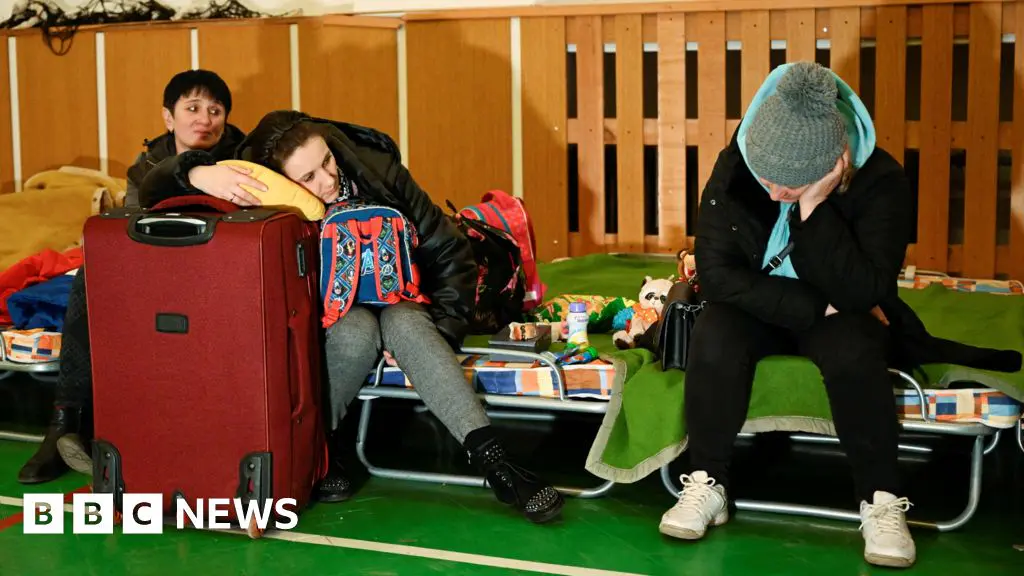
Slovakia's Prime Minister Robert Fico has threatened to cut financial support for more than 130,000 Ukrainian refugees as a dispute with Ukraine over Russian gas supplies escalates.
On 1 January, Kyiv shut off a pipeline that for decades was used to supply Central Europe with Russian natural gas.
Slovakia had been the main entry point and the country now stands to lose millions of euros in transit fees.
The UN's refugee agency (UNHCR) estimated last month that there were 130,530 Ukrainian refugees in Slovakia out of 6,813,900 globally.
Fico - who in December made a surprise visit to Moscow for talks with Russia's President Vladimir Putin - described Kyiv's move as "sabotage".
The prime minister of the EU state said he would propose halting electricity exports to Ukraine and also "sharply reducing" financial support for Ukrainians who have found shelter in Slovakia.
He said there was no risk of Slovakia itself suffering from gas shortages, as it had already made alternative arrangements.
But Fico added that Ukrainian President Volodymyr Zelensky's decision to turn off the taps would deprive Slovakia of 500m euros (£415m; $518m) in transit fees from other countries.
He said his party was ready to debate "halting supplies of electricity" and the "significant lowering of support for Ukrainian citizens in Slovakia".
"The only alternative for a sovereign Slovakia is renewal of transit or demanding compensation mechanisms that will replace the loss in public finances," he added.
Last month Zelensky accused Fico of helping Putin to "fund the war and weaken Ukraine".
"Fico is dragging Slovakia into Russia's attempts to cause more suffering for Ukrainians," the Ukrainian president had said.
Poland has offered to support Kyiv in case Slovakia cuts off its electricity exports - supplies that are crucial to Ukraine, whose power plants come under regular attack from Russia.
Poland's government called Ukraine's shutdown of Russian gas supplies "another victory" against Moscow while the European Commission said the EU had prepared for the change and most states could cope.
Moldova, which is not in the EU, is already suffering shortages.
Russia can still send gas to Hungary, Turkey and Serbia through the TurkStream pipeline across the Black Sea.
Slovakia threatens to reduce aid to Ukrainian refugees in spat over Russian gas
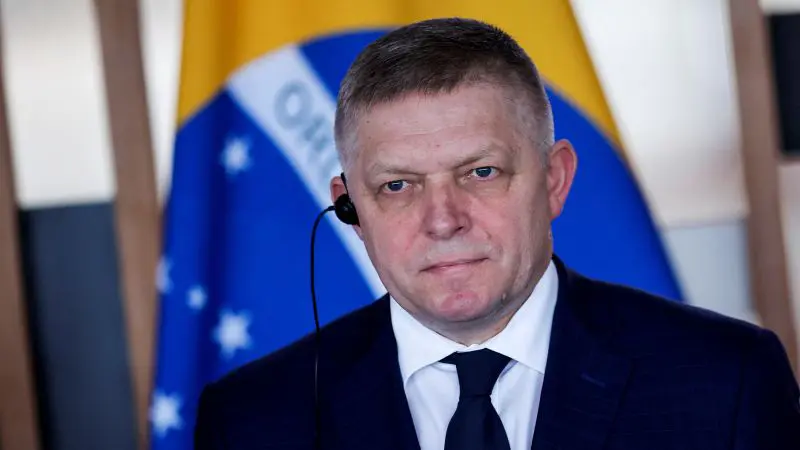
Slovakia could take retaliatory measures against Ukraine after Kyiv halted the flow of Russian gas through its territory, Slovak Prime Minister Robert Fico warned.
In a video message posted to Facebook Thusday, Fico suggested his Smer party could cut its electricity supplies to Ukraine, as well as reducing aid to Ukrainian refugees.
Slovakia exported 2.4 million megawatt hours of electricity to Ukraine in the first 11 months of 2024, Reuters reported, citing data from the country’s grid operator, helping the war-torn country meet shortages caused by Russian bombing of its energy infrastructure.
On New Year’s Day, Ukraine made good on its promise to halt the transport of Russian gas to Europe through its territory after a key deal with Moscow expired. Ukrainian President Volodymyr Zelensky hailed the move as “one of Moscow’s greatest defeats.”
Fico described the ending of Russian gas flows as “sabotage” by Zelensky and said a Slovak delegation would discuss the situation in Brussels next Tuesday. After that, he said, his ruling coalition would consider retaliation.
“I declare (my Smer-SSD party) are ready to debate and agree in the coalition on halting supplies of electricity and on significant lowering of support for Ukrainian citizens in Slovakia,” Fico said.
“The only alternative for a sovereign Slovakia is renewal of transit or demanding compensation mechanisms that will replace the loss in public finances of nearly 500 million euros.”
Tensions between Kyiv and Bratislava have escalated in recent days, with Fico warning on Wednesday that the halting of Russian gas flows via Ukraine would have a “drastic” impact on the European Union but not on Russia.
Fico had previously argued that the end of the deal would lead to higher gas and electricity prices in Europe.
After putting an end to Russian gas flows to Europe via its territory, Ukraine now faces a loss of some $800 million a year in transit fees from Russia, while Kremlin-owned gas giant Gazprom will lose close to $5 billion in gas sales, according to Reuters.
On December 22, Fico was hosted by Russian President Vladimir Putin in Moscow, marking a rare visit to the Kremlin by an EU leader since Moscow launched its invasion of Ukraine in February 2022.
Fico’s views on Russia’s war on Ukraine vary greatly from those of the majority of European leaders. Since returning to powerin 2023, Fico has ended his country’s military aid to Ukraine and pledged to block Ukraine from joining NATO. He has also been critical of EU sanctions on Russia.
CNN’s Kosta Gak, Alex Stambaugh and Anna Cooban contributed reporting.
Russia shoots down eight ATACMS, captures eastern Ukraine settlement, says defence ministry

Jan 4 (Reuters) - Russia's defence ministry said on Saturday that Russian forces had taken control of the village of Nadiya in Ukraine's eastern Luhansk region and had shot down eight U.S.-made ATACMS missiles.
Reuters could not immediately verify the battlefield reports.
The ministry said its air defence systems had shot down 10 Ukrainian drones over Russian territory on Saturday morning, including three over the northern Leningrad region.
St Petersburg's Pulkovo airport temporarily halted flight arrivals and departures on Saturday morning.
Russia's Izvestia says reporter killed in drone strike in eastern Ukraine

Jan 4 (Reuters) - The Russian media outlet Izvestia said on Saturday that a Ukrainian drone strike killed its reporter near the city of Donetsk in eastern Ukraine.
"The Ukrainian army launched a drone strike on a civilian car carrying Izvestia's freelance correspondent Alexander Martemyanov," the daily reported on its Telegram channel.
"The car was located far from the line of contact."
Izvestia said the car was travelling on a highway linking Donetsk, the Russian-held main town of Donetsk region, and the city of Horlivka to the north.
Russian Foreign Ministry spokeswoman Maria Zakharova, writing on her ministry's website, denounced the incident as "deliberate murder".
Zakharova described it as "another brutal crime in a series of bloody atrocities" of President Volodymyr Zelenskiy's government "which openly resorts to terrorist methods to eliminate its ideological opponents".
Data previously provided by the Committee to Protect Journalists counted at least 15 journalists killed since Russia's February 2022 full-scale invasion of Ukraine.
Russia's RIA news agency said two of its correspondents travelling with Martemyanov were injured in the incident, along with two journalists working for a local publication in Donetsk.
Ukraine in maps: Tracking the war with Russia
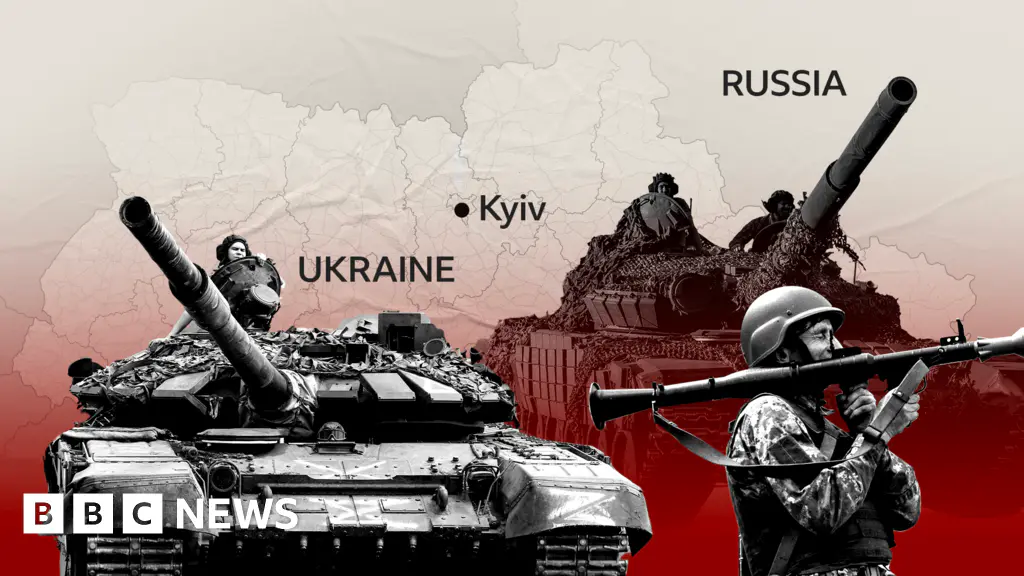
Fighting has raged in Ukraine since Russia launched a full-scale invasion in February 2022. Russian forces have slowly expanded the amount of territory they control over the last year, mostly in the east of Ukraine, but Ukrainian forces have made those advances as slow and difficult as possible and even staged a counter-offensive into Russian territory.
Here is a recap of recent significant events and the situation in Ukraine.
In November, Ukraine reported its troops had engaged in combat with North Korean troops in the Kursk region of Russia.
Moscow and Pyongyang have not responded to the claim that North Korean soldiers have been under fire, but US intelligence and Nato have confirmed there is evidence of North Korean troops being involved in Russia's war.
The arrival of North Korean troops was cited by US officials as a reason for President Biden giving the green light for Ukraine to use long-range ATACMS missiles to strike inside Russia.
How that decision will affect the war in the coming months is still to be seen, but Ukraine now has the potential to hit targets almost 200 miles (300km) from the Russia-Ukraine border.
The appearance of North Korean troops in the Kursk region was a response to a surprise attack launched across the border by Ukrainian troops in August, advancing up to 18 miles (30km) into the Russian region.
Almost 200,000 people were evacuated from areas along the border by the Russian government and President Vladimir Putin condemned the Ukrainian offensive as a "major provocation".
After two weeks, Ukraine's top commander claimed to control more than 1,200 sq km of Russian territory and 93 villages. The regions of Kursk and Belgorod have both declared a state of emergency.
Some of that territory has been regained by Russia but Ukraine still has troops in the Kursk region.
The counter-offensive is seen partly as an attempt to force Russia to redeploy units from the east and relieve pressure on the beleaguered Ukrainian defences there, and partly as a bid to improve Ukraine's chances of a peace settlement.
At the beginning of May 2024, Russian forces crossed the international border to the north of Ukraine's second-biggest city, Kharkiv. Several villages were seized and thousands of civilians fled.
Russia's main offensive has long focused on the eastern Donetsk region, but this was one of the most significant ground assaults since the start of the war and further stretched Ukraine's front-line defences.
The Russian push took place at the end of a four-month period when the US was not supplying weapons to Ukraine, due to a stalemate in the US Congress.
The issue was finally resolved at the end of April, when the US passed a $61bn aid package to provide missiles, artillery and air-defence systems to the Ukrainian military.
Ukrainian forces eventually held firm and even though the city of Kharkiv has come under repeated attack from glide bombs fired by Russian warplanes, it remains beyond the range of Russian artillery.
The incursion north of Kharkiv was some distance from the main front line in the east where Russia has continued its offensive operations and been edging forwards since October 2023.
Eastern Ukraine has been contested territory since 2014, when Russian-backed fighters seized large swathes of the eastern Donetsk and Luhansk regions.
Russia's biggest advantage is manpower and it has shown a willingness to throw soldiers at Ukrainian positions to gain a few metres at a time.
According to the UK chief of defence staff Sir Tony Radakin, more than 1,500 Russian soldiers were being killed or wounded every day in October. That is the highest rate since the beginning of the war, exceeding the 1,200 being killed or wounded every day in May and June.
Experts at the Institute for the Study of War believe Russian forces will likely continue to focus on seizing frontline Ukrainian towns and cities this winter with the city of Pokrovsk as one of their main targets.
The Russian advance towards Pokrovsk is the most notable change in control of the front line near Donetsk for several months, but innovative tactics by Ukrainian forces, combining the use of drones and ground forces, appears to have held up a direct assault by the Russians and inflicted significant losses of troops and equipment.
The recent defence of Pokrovsk follows the Ukrainian withdrawal from Avdiivka, just north of Donetsk, back in February after months of fighting.
Almost all of Avdiivka's pre-war population of more than 30,000 people have left and the town itself is almost completely destroyed.
To the north, areas around Bakhmut have remained a flashpoint and have endured some of the heaviest fighting of the war.
Although Ukraine gained some ground around Chasiv Yar, which is situated on high ground some 10km west of Bakhmut, Russian forces have since made further advances in the area.
Russia's invasion began with dozens of missile strikes on cities all over Ukraine before dawn on 24 February 2022.
Russian ground troops moved in quickly and within a few weeks were in control of large areas of Ukraine and had advanced to the suburbs of Kyiv.
Russian forces were bombarding Kharkiv, and they had taken territory in the east and south as far as Kherson, and surrounded the port city of Mariupol.
But they hit very strong Ukrainian resistance almost everywhere and faced serious logistical problems with poorly motivated Russian troops suffering shortages of food, water and ammunition.
Ukrainian forces were also quick to deploy Western supplied arms such as the Nlaw anti-tank system, which proved highly effective against the Russian advance.
By October 2022, the picture had changed dramatically and having failed to take Kyiv, Russia withdrew completely from the north. The following month, Ukrainian forces recaptured the southern city of Kherson.
Since then, the battle has mostly been in the east of Ukraine with Russian forces slowly gaining ground over many months, with at least 70,000 Russian troops killed - and an estimated 500,000 being either killed or injured in total, according to the UK Ministry of Defence.
By Dominic Bailey, Mike Hills, Paul Sargeant, Chris Clayton, Kady Wardell, Mark Bryson, Sana Dionysiou, Gerry Fletcher, Kate Gaynor and Erwan Rivault
To indicate which parts of Ukraine are under control by Russian troops we are using daily assessments published by the Institute for the Study of War with the American Enterprise Institute's Critical Threats Project.
The situation in Ukraine is often fast moving and it is likely there will be times when there have been changes not reflected in the maps.
Ukraine front could 'collapse' as Russia gains accelerate, experts warn
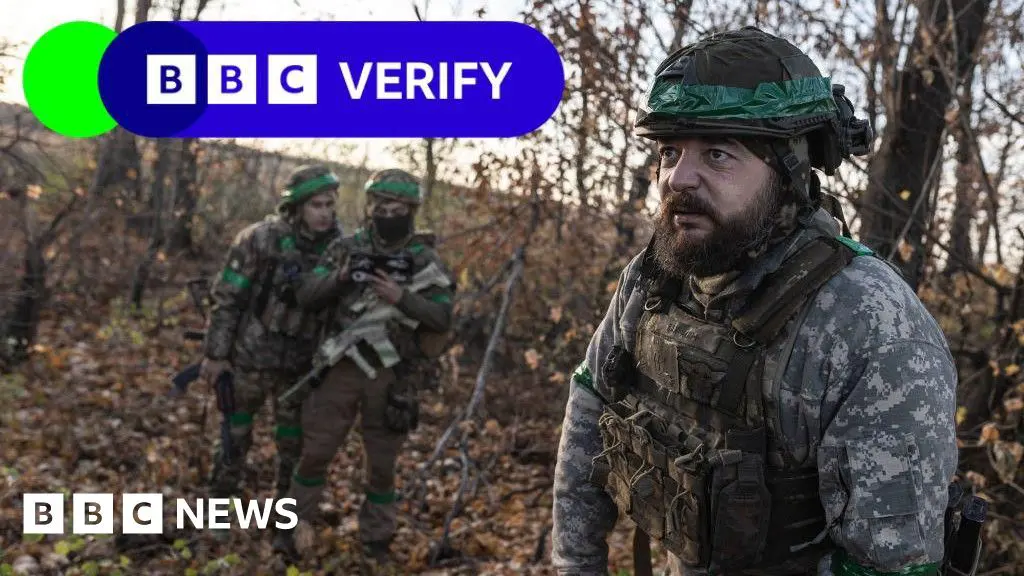
President Biden’s decision to provide anti-personnel mines to Ukraine, and allow the use of long-range missiles on Russian territory comes as the Russian military is accelerating its gains along the front line.
Data from the Institute for the Study of War (ISW) shows that Russia has gained almost six times as much territory in 2024 as it did in 2023, and is advancing towards key Ukrainian logistical hubs in the eastern Donbas region.
Meanwhile, Ukraine's surprise incursion into Russia's Kursk region is faltering. Russian troops have pushed Kyiv's offensive backwards. Experts have questioned the success of the offensive, with one calling it a "strategic catastrophe" given manpower shortages faced by Ukraine.
These developments come at a time of heightened uncertainty with a second Donald Trump administration looming. The US president-elect has vowed to bring the war to a close when he takes office in January, with some fearing he could cut future military aid to Ukraine.
In the first few months of the war the front line moved quickly, with Russia gaining ground quickly before being pushed back by a Ukrainian counteroffensive. But in 2023 neither side made any major gains - with the conflict largely sliding into a stalemate.
But new ISW figures suggest the story in 2024 is more favourable for Russia. The ISW bases its analysis on confirmed social media footage and reports of troop movements.
The ISW data shows Moscow’s forces have seized around 2,700 sq km of Ukrainian territory so far this year, compared with just 465 sq km in the whole of 2023, a near six-fold increase.
Dr Marina Miron, a defence researcher at Kings College London, suggested to the BBC that there was a possibility the Ukrainian eastern front “might actually collapse” if Russia continued to advance at pace.
More than 1000 sq km was taken between 1 September and 3 November, suggesting the push accelerated in recent months. Two areas bearing the brunt of these advances are Kupiansk in Kharkiv region, and Kurakhove, a stepping stone to the key logistical hub of Pokrovsk in Donetsk region.
Kupiansk and areas to the east of the Oskil river were liberated in the Kharkiv offensive of 2022, but Russia has progressively retaken the latter area. In a recent intelligence update, the UK's Ministry of Defence said Russian forces were trying to breach the north-eastern outskirts of the city.
Footage posted on 13 November and verified by the BBC is consistent with this analysis. The video shows a convoy of Russian armour being repelled after making it to within 4km of the key bridge at Kupiansk, the last major road crossing in the area.
While these reports do not necessarily translate to control of an area, it is indicative of how stretched Ukraine’s defensive line has become.
Elsewhere, since retaking the city of Vuhledar in October - an elevated position which sits above key supply lines and which Moscow spent two years fighting for - Russia has thrown resources at Kurakhove.
Ukraine’s forces defending the city have so far repelled attacks to the south and east. But the front line creeps ever closer, with Russia also threatening to encircle defenders from the north and west.
Col Yevgeny Sasyko, a former head of strategic communications with Ukraine’s general staff, said Russia places “powerful jaws” around the flanks of a city that slowly “grind though” defences until they collapse.
Footage from the city verified by the BBC showed massive destruction, with residential buildings heavily damaged.
The ISW concludes Moscow now holds a total of 110,649 sq km in Ukraine. For comparison, Ukrainian forces seized just over 1,171 sq km in the first month of its incursion into Kursk - though Russian forces have now retaken nearly half of that territory.
- Biden agrees to give Ukraine anti-personnel mines
- What we know about missile system Ukraine has used to strike Russia
- What arms are the US, UK and other nations supplying?
Despite its territorial gains, Russia's advance has come at a huge cost.
An analysis carried out by BBC Russian confirmed that at least 78,329 troops have been killed since Russia launched its full-scale invasion in February 2022, with Moscow’s losses from September to November this year more than one-and-a-half times greater than the same period in 2023.
The losses are compounded by the “meat grinder” approach said to be favoured by Russian commanders - describing the waves of recruits thrown towards Ukrainian positions in a bid to exhaust troops.
Despite the Russian advances, some experts have noted that the actual speed of the offensive is still slow. David Handelman, a military analyst, suggested Ukrainian troops in the east were slowly withdrawing to preserve manpower and resources, rather than suffering from a broader collapse.
Ukraine launched its shock incursion into Russia’s Kursk region in August. It is unclear why Russia took so long to respond to the operation, which saw Kyiv’s troops quickly gain control over a number of border communities.
Dr Miron suggested that while the Kremlin would suffer a domestic political cost for as long as the incursion continued, Russia’s general staff had been keen to keep Ukraine’s forces tied down in Kursk as its forces made gains elsewhere along the front line.
But Moscow is now clearly intent on reclaiming the territory lost on its own soil. Some 50,000 troops have been deployed to the region.
Verified videos from the Kursk region show fierce fighting is taking place - and that Russia is suffering considerable losses in terms of manpower and equipment. But the data clearly shows Ukraine’s control of the region is shrinking.
Since the start of October, Russian counter-attacks have regained some 593 sq km worth of territory in the border region, ISW figures showed.
The Kursk incursion was initially a major boon for Ukraine in terms of morale at a time of serious setbacks, and the audacity of the operation was a reminder of its ability to surprise and harm its enemy.
But Dr Miron said while the Kursk incursion was a moment of “tactical brilliance” it has also been a “strategic catastrophe” for Ukraine.
“The whole idea was to maybe gain some political leverage in potential negotiations, but militarily to draw the Russian forces away from the Donbas in order to liberate Kursk. And what we're seeing instead is that Ukrainian units are tied down there.”
Some of Kyiv’s most experienced and effective units are known to be fighting in Kursk. Mechanised units equipped with state-of-the-art Western armour are also involved in the offensive.
Ukrainian leaders had hinted that they hoped the incursion would force Moscow to redirect some of its forces from eastern Ukraine, slowing the Russian advance there. Instead, experts say most reinforcements were moved to Kursk from parts in Ukraine where the fighting is not as intense.
“According to Ukrainian soldiers from different parts of the front, the Russian troops reinforcing Kursk were mainly pulled from Kherson and Zaporizhzhia,” Yurri Clavilier, a land analyst with the International Institute for Strategic Studies, told the BBC.
“The fighting there is not as intense as it is in the East. Some Russian units attacking Kharkiv were also redirected to Kursk as Ukraine managed to stall the Russian onslaught there,” he added.
The importance of territory to both sides is the strength it lends to their position in any potential negotiations. Although no peace negotiations have been discussed, US President-elect Trump has claimed he could end the war within 24 hours, without saying exactly how.
Fears persist in Ukraine that Trump could cut military aid as a means to force Kyiv to the table. President Volodymyr Zelensky told Fox News on Tuesday "I think we will lose [the war]" if cuts are pushed through.
"We have our production, but it's not enough to prevail and I think it's not enough to survive," he said.
On Tuesday, Ukraine fired US-supplied long-range missiles into Russia for the first time - a day after Washington gave it permission to do so. It is thought that the decision was made in part to help Ukraine hold on to part of the Kursk region, to help use as a bargaining chip in future negotiations.
Dr Miron told the BBC that Russia’s advance has handed them a stronger negotiating position as Trump’s new foreign policy team prepare to take office.
“What they're controlling right now, it does give them a certain advantage,” she said. “If it came to negotiations, I'm sure that as the Russian side has been stressing, ‘we will do it based on the battlefield configuration’.
“From a Russian perspective, they have much better cards than the Ukrainians.”
What do you want BBC Verify to investigate?
Hungary says TurkStream could help supply Europe with gas if transit via Ukraine ends
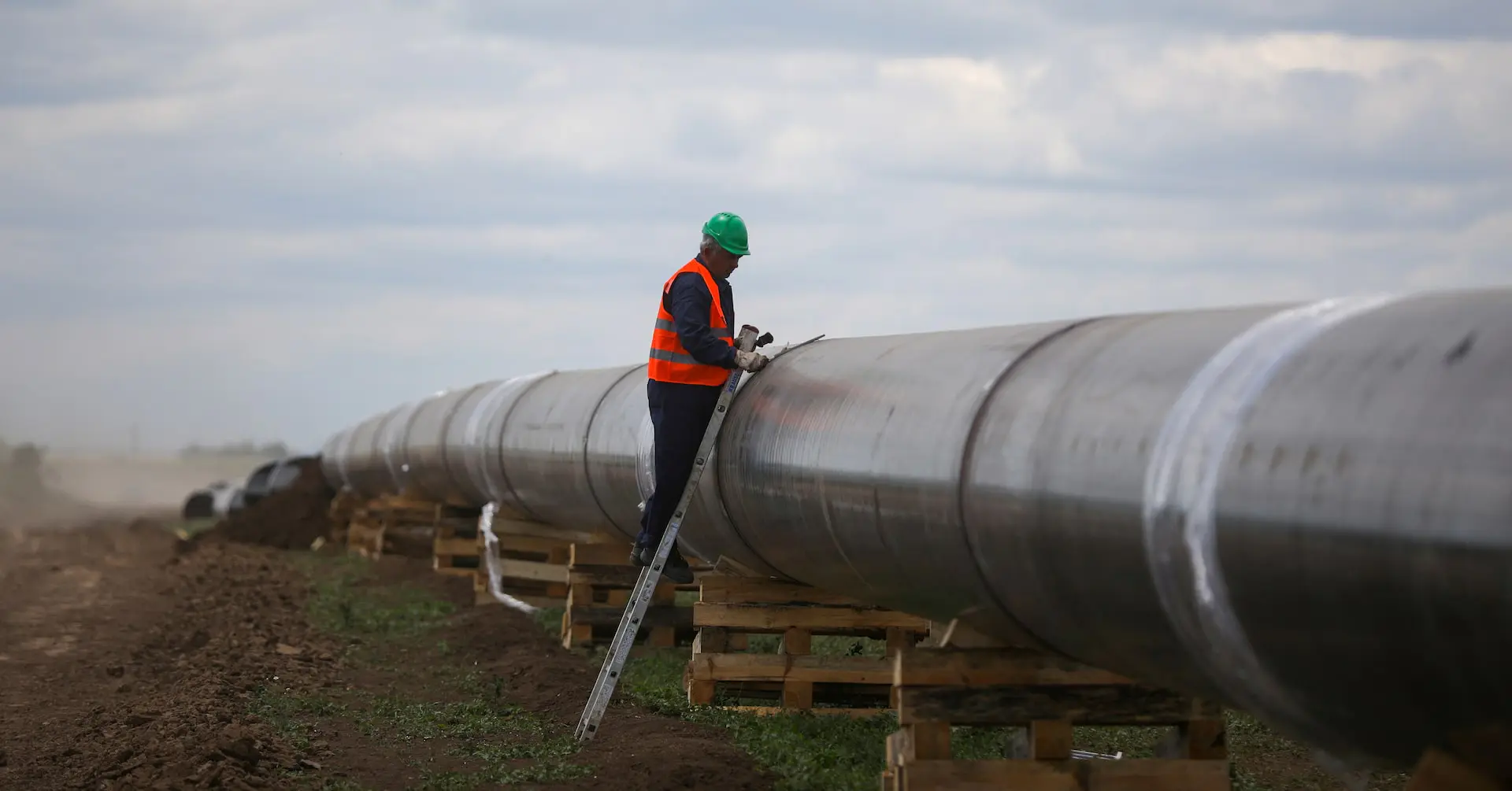
MOSCOW, Oct 10 (Reuters) - The TurkStream pipeline that ships Russian gas to Turkey via the Black Sea could help Europe to cope with the expected loss of gas pumped via Ukraine, Hungarian Foreign Minister Peter Szijjarto said on Thursday.
A five-year deal between Kyiv and Moscow on Russian gas transit via Ukraine to Europe will expire on Dec. 31. An extension is seen as unlikely, given the military conflict between the two countries.
Szijjarto said the loss of Russian gas routed via Ukraine will not hurt Hungary as the country receives Russian gas via the TurkStream pipeline.
"This alternative route may help not only Hungary, but other countries of Central Europe if they face a serious situation in case there is no transit via Ukraine," he told the St Petersburg International Gas Forum.
Hungary, in contrast to most European Union countries, seeks to maintain close political and business ties with Russia.
Ukraine has said it will not renew its deal with Russia, and Moscow has said the decision lies with Ukraine and Europe.
Russia shipped about 15 billion cubic metres (bcm) of gas via Ukraine in 2023. That was equivalent to just 8% of peak Russian gas flows to Europe via various routes in 2018-2019.
Russian energy giant Gazprom (GAZP.MM) , opens new tab said later on Thursday that it had signed a memorandum of understanding with Hungary on a possible increase in supplies of Russian gas, at a meeting attended by Gazprom chief Alexei Miller and Szijjarto. No details were revealed.
Szijjarto said Hungary is satisfied with its cooperation with Gazprom and that it has no attractive alternatives.
"This year we are receiving 6.7 billion cubic metres of gas altogether from Gazprom in Hungary... This will make TurkStream totally utilised in its full capacity," Szijjarto said.
